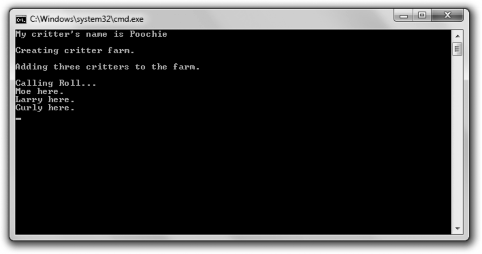
< Previous | Contents | Next >
The Critter Farm program defines a new kind of critter with a name. After the program announces a new critter’s name, it creates a critter farm—a collection of critters. Finally, the program calls roll on the farm and each critter announces its name. Figure 9.1 shows the results of the program.

Figure 9.1
The critter farm is a collection of critters, each with a name.
You can download the code for this program from the Course Technology website (www.courseptr.com/downloads). The program is in the Chapter 9 folder; the filename is critter_farm.cpp.
//Critter Farm
//Demonstrates object containment
#include <iostream> #include <string> #include <vector>
Using Aggregation 289
using namespace std; class Critter
{
public:
Critter(const string& name = ""); string GetName() const;
private:
string m_Name;
};
Critter::Critter(const string& name): m_Name(name)
{}
inline string Critter::GetName() const
{
return m_Name;
}
class Farm
{
public:
Farm(int spaces = 1);
void Add(const Critter& aCritter); void RollCall() const;
private:
vector<Critter> m_Critters;
};
Farm::Farm(int spaces)
{
m_Critters.reserve(spaces);
}
void Farm::Add(const Critter& aCritter)
{
m_Critters.push_back(aCritter);
}
290 Chapter 9 n Advanced Classes and Dynamic Memory: Game Lobby
void Farm::RollCall() const
{
for (vector<Critter>::const_iterator iter = m_Critters.begin(); iter != m_Critters.end();
++iter)
{
cout << iter->GetName() << " here.\n";
}
}
{
Critter crit("Poochie");
cout << "My critter’s name is " << crit.GetName() << endl;
cout << "\nCreating critter farm.\n"; Farm myFarm(3);
cout << "\nAdding three critters to the farm.\n"; myFarm.Add(Critter("Moe")); myFarm.Add(Critter("Larry")); myFarm.Add(Critter("Curly"));
cout << "\nCalling Roll.. .\n"; myFarm.RollCall();
return 0;
}